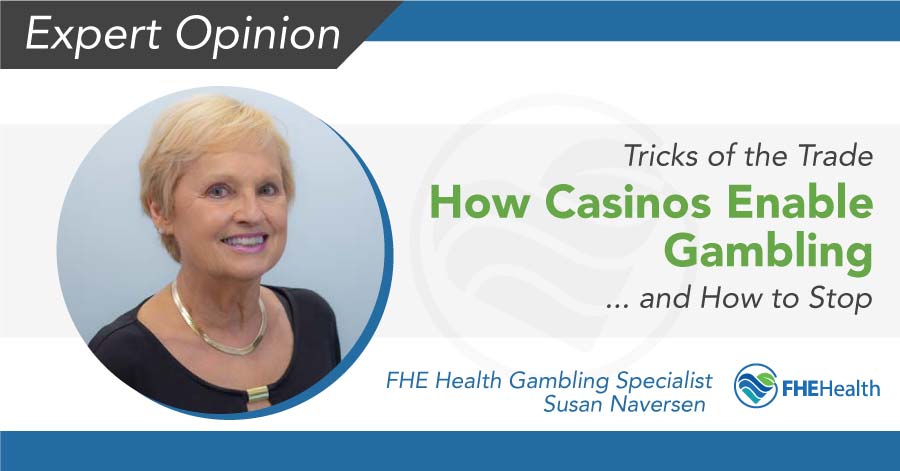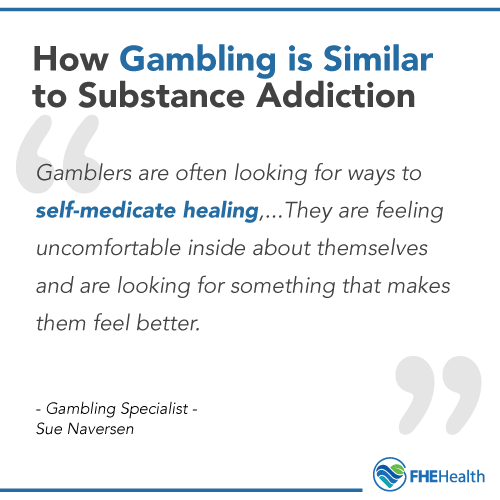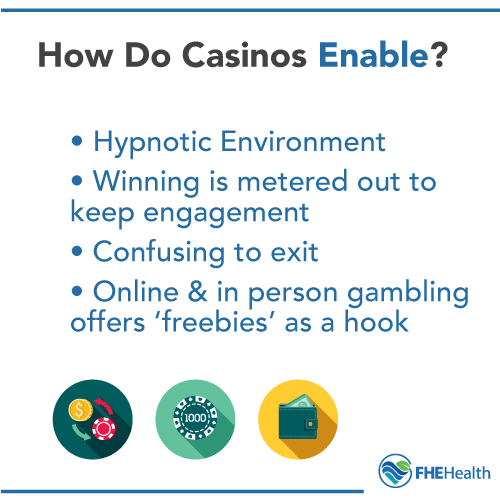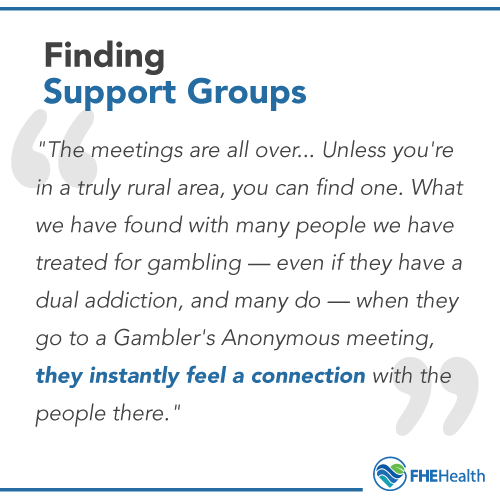
Gambling can become an addiction just as substances such as cocaine or heroin can, says Susan Naversen, MS, AP-DOM and compulsive gambling specialist at FHE Health.
“Gambling addiction is the first non-substance to be included as an addiction in the DSM-5,” says Naversen. That’s the 5th edition of the Diagnostic and Statistical Manual of Mental Disorders, a book published by the American Psychiatric Association. It’s what mental health professionals, insurance companies and other organizations use as a guide when officially diagnosing disorders, including addiction.
In her role with FHE Health, Naversen works with individuals who are struggling with gambling addiction in individual and group therapy environments. She offers an expert account of what gambling addiction might look like, how casinos and other businesses enable it and what type of action to take if you believe you or someone you love is suffering from an addiction to gambling.
How Does Gambling Addiction Work?
 Naversen notes that gambling addiction often has the same origin as many other addictions. “Gamblers are often looking for ways to self-medicate healing,” she says. “They are feeling uncomfortable inside about themselves and are looking for something that makes them feel better.”
Naversen notes that gambling addiction often has the same origin as many other addictions. “Gamblers are often looking for ways to self-medicate healing,” she says. “They are feeling uncomfortable inside about themselves and are looking for something that makes them feel better.”
Gambling — especially the winning — gives someone a temporary rush or high that does that. As the addiction develops, it works like an addiction to alcohol or drugs. The person may have to gamble more frequently or at higher odds to get the same rush. They turn to it more often, just as someone might turn to shopping, sex, porn or other activities that provide that temporary good feeling. But the addiction begins to control their life; someone who is addicted to gambling can’t necessarily control their own behavior when it comes to gambling.
Naversen says gambling isn’t exactly like a physical addiction to a substance. “You can’t test for it. You can’t do a blood test or a breathalyzer,” she notes. “But it does change brain waves, and in that sense, a physical change does occur as someone gambles.”
She also notes that individuals who are dealing with a gambling addiction can experience withdrawals. “They go through a state of withdrawal where they may be very hostile or have other symptoms. It’s a lot like cocaine withdrawals in some ways,” says Naversen.
How Do Casinos Enable Gambling?

“Before you walk into the casino, there are the billboards and advertisements that lure people to the front door. Once they walk into the casino, they’re not going to find clocks or windows. They’ll find lights, sounds, and activities that light up the rewards section of the brain. The ambiance is almost hypnotic,” says Naversen.
She notes that even the flooring serves a purpose in these environments. “The carpets themselves are psychedelic in nature to keep the person’s attention focused on the activity in the room.”
The games are designed to keep people playing, she says. Slots, for example, will afford small wins or almost wins, encouraging people to think they are just about to win big. So, they keep playing.
“There’s a lot of freebies,” Naversen says. “And food is accessible. The more someone gambles, the more they get in free rooms, dinners and drinks. And casinos offer all sorts of prizes to keep people wanting to return.”
Naversen also notes that the overall design of casinos, which can be labyrinthine in nature, make it confusing to exit. Some casinos also pump extra oxygen into the rooms to keep people alert. Because you can’t tell whether it’s day or night, and may not be able to rely on your internal clock in that environment, you may gamble much longer than intended.
Online casinos also have their own ways of enticing people to game, says Naversen. For example, once you gamble online, you may get invitations from other sites.
“You get invitations and emails constantly saying you can gamble for free one time,” she says. “Anything to lure the person to gambling more online. It’s the same as the casino, except you’re on a phone or laptop, and it’s more convenient for people because they can be at home and relaxing and get on phones or computers and get hooked.”
Signs You Might Be Addicted to Gambling
Naversen notes that some people do gamble for entertainment but provides some signs that help you know if you’ve moved on to an addiction. If you can answer yes to any of these questions, you may be dealing with a gambling addiction.
- Do you bet more than intended? For example, Naversen says someone might plan to go to a casino for entertainment, saying “I’m bringing this $200, and once it’s gone, I’ll leave.” If that person doesn’t leave but goes to the ATM for more money to continue gambling instead, it could be a sign of addiction.
- Are you unable to leave the casino with your winnings without betting them?
- Whether you win or lose, do you find yourself needing to return to the casino as soon as possible?
- Is your gambling detrimental to your relationships or work?
Treatment for Gambling Addiction

“The meetings are all over,” she says. “Unless you’re in a truly rural area, you can find one. What we have found with many people we have treated for gambling — even if they have a dual addiction, and many do — when they go to a Gambler’s Anonymous meeting, they instantly feel a connection with the people there.”
FHE Health provides inpatient treatment supported with specialist therapy for gambling addiction. Naversen says inpatient treatment often begins with a detox period to help individuals get through withdrawals. She meets with anyone who may have a gambling addiction to assess their needs and invites them to a group.
“We have three 3-hour groups a week. They tend to be small in size, very intimate, very open, very supportive groups where we do nothing but talk about their gambling problems and anything related to it such as dual addictions or mental health issues.”
Naversen says that FHE Health takes a holistic approach to treating every individual, which is beneficial for those who are facing gambling addiction as well as those who might also need treatment for other types of mental health or addiction disorders.






